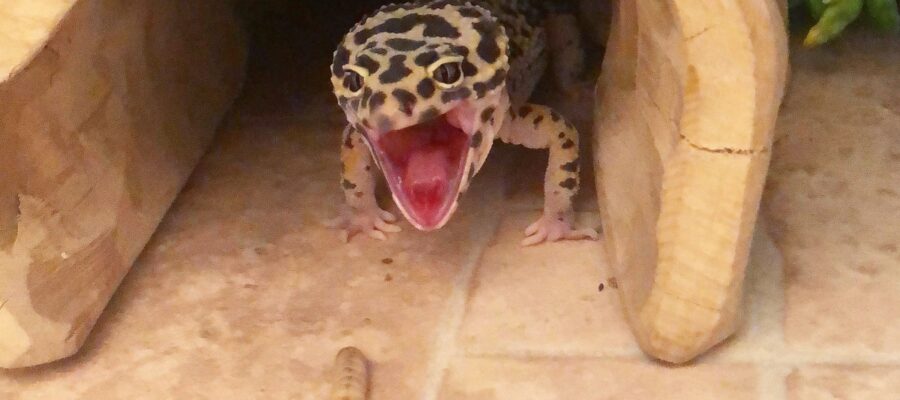It can be alarming when your leopard gecko stops eating, and there are so many reasons a leopard gecko may have lost its appetite so it can be difficult to pinpoint a single reason.
This isn’t an extensive list, but it covers the basic things I would suggest checking for to get to the bottom of an appetite loss before seeking professional help.
Has their environment changed?
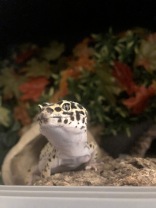 If you have a new leopard gecko, the change of scenery and the stress of moving is enough to make them hide away and refuse food, sometimes for up to 2 weeks. Do not worry if your new leopard gecko is not eating at first – this is totally normal!
If you have a new leopard gecko, the change of scenery and the stress of moving is enough to make them hide away and refuse food, sometimes for up to 2 weeks. Do not worry if your new leopard gecko is not eating at first – this is totally normal!
Even being moved into a different room, redecorating your room, or changing the setup of their vivarium can be enough to make them stressed and lose their appetite.
Give them a while to settle into the new environment, don’t hassle them too much, and leave a dish of mealworms for them to help themselves to if they feel like it.
What substrate are they being kept on?
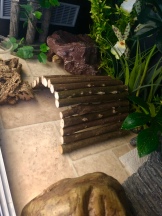 Loose substrate of any type can cause impaction, so if your gecko isn’t eating and also not pooping, there’s a chance that something has got stuck in their system.
Loose substrate of any type can cause impaction, so if your gecko isn’t eating and also not pooping, there’s a chance that something has got stuck in their system.
If you suspect your leopard gecko is impacted, switch to a different substrate immediately and try giving the gecko a warm bath and belly massage to loosen the impaction.
If you suspect your leopard gecko has impaction, and your gecko still isn’t eating or pooping after some baths and belly rubs, then consider taking them to an exotic vet.
What temperature is their thermostat set to?
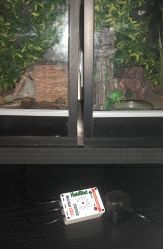 The temperature of the gecko’s heat mat is important, because heat gives energy, and aids digestion and metabolism. If the mat is too hot, the gecko may not be spending enough time on there, and if it’s too cool they may not be getting sufficient belly heat.
The temperature of the gecko’s heat mat is important, because heat gives energy, and aids digestion and metabolism. If the mat is too hot, the gecko may not be spending enough time on there, and if it’s too cool they may not be getting sufficient belly heat.
As a starting point, I would set my thermostat to 28C (or 85F) and adjust it slightly based on; my geckos’ behaviour, the ambient temperature of their vivarium (measured by a thermometer) and what the time of year it is (for example, in winter you may need to increase temperatures slightly).
Try adjusting your geckos temperature by a very small amount (for example I would maybe go from 28 to 29C) and leaving for a few days, and seeing if this makes the gecko more active and hungry.
What’s their existing diet like?
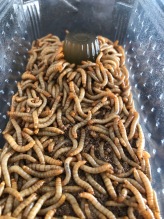 I heard that leopard geckos could be fussy eaters, but didn’t quite believe it until mine reached adolescence. My female, Nim, will eat every insect apart from mealworms, and my male, Charizard, started refusing all insects OTHER THAN mealworms.
I heard that leopard geckos could be fussy eaters, but didn’t quite believe it until mine reached adolescence. My female, Nim, will eat every insect apart from mealworms, and my male, Charizard, started refusing all insects OTHER THAN mealworms.
Make sure you are feeding your geckos a selection of insects, especially if they seem to be refusing the same insects you’ve been feeding them since they were babies. Also make sure your insects are gutloaded and dusted with calcium and vitamins.
Make sure the insects aren’t too big, or too quick for your geckos to catch. The size should be no larger than their heads. If the insects are escaping from your geckos, try feeding them slow insects which have been cooled in the fridge for 30 minutes, or try feeding ones which can’t escape from a smooth-sided dish (such as mealworms, morio worms, dubia roaches, phoenix worms).
Loose insects running around their enclosure can also be stressful for geckos, so make sure you remove any insects if they go uneaten after a few hours (particularly locusts and crickets).
Does your leopard gecko have parasites?
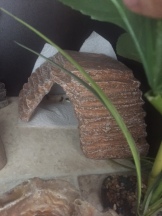 If your gecko’s poop has changed (does it smell bad, have blood, or is it very watery?), if they are lethargic, losing weight and also refusing food, then they could have parasites.
If your gecko’s poop has changed (does it smell bad, have blood, or is it very watery?), if they are lethargic, losing weight and also refusing food, then they could have parasites.
Take a sample of your geckos faeces to an exotic vet to be examined if you suspect parasites, and they will be able to tell you if your suspicions are true.
Putting down some paper towel where they poop is an easy way to collect the faeces.
The only way to treat parasites is with professional help, so they will advise on next steps if parasites are the cause.
Make sure you quarantine your gecko from other reptiles if they have parasites.
Are you cohabiting leopard geckos?
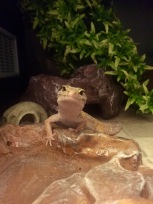 Cohabiting leopard geckos is dangerous. Many people know that housing two males together is dangerous as they can fight to the death, but there are many people who believe that it’s OK to house multiple females together, or a male with females.
Cohabiting leopard geckos is dangerous. Many people know that housing two males together is dangerous as they can fight to the death, but there are many people who believe that it’s OK to house multiple females together, or a male with females.
There are many leopard gecko owners who have had issues housing two females, or a male with a female, as fights and injuries can still happen.
The truth is, leopard geckos are solitary beings, and can suddenly get territorial over their space and food.
Bullying or competition for food is a likely cause for appetite loss, so if you are cohabiting leopard geckos, please separate them and this should help with regaining their appetite.
Has your leopard gecko just shed?
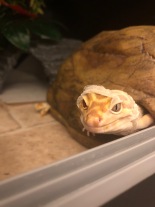 There are several ways to tell if your leopard gecko is about to shed, which happens about once per month for adults.
There are several ways to tell if your leopard gecko is about to shed, which happens about once per month for adults.
When leopard geckos shed, they eat the skin, which can fill up their tiny bellies quite substantially.
They may also feel vulnerable after a shed and could be more likely to stay hidden for a few days, while they warm their bellies and digest the skin they’ve just feasted on.
If this is happening then try to be patient, they should regain their appetite after a few days.
How old is your gecko?
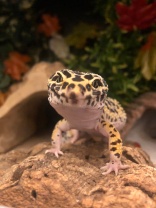 When geckos are about 6 months – 1 year (males) and 8 – 18 months (females) they can exhibit behavioural changes due to reaching sexual maturity, which can include losing their appetite.
When geckos are about 6 months – 1 year (males) and 8 – 18 months (females) they can exhibit behavioural changes due to reaching sexual maturity, which can include losing their appetite.
If everything else seems fine with your gecko from the list above, then this could be the cause. My male stopped eating for around 8-12 weeks the summer after I bought him, but luckily his tail was nice and fat by then and the fat stores could sustain him throughout this time.
When females are ovulating during breeding months (starting from around January till summer) they may lose their appetites and become more skittish, and males may become more restless, want to come out more, and may also lose appetites.
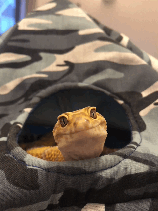 My male leopard gecko (Charizard) so far hasn’t lost his appetite, but recently he has exhibited signs of being on heat.
My male leopard gecko (Charizard) so far hasn’t lost his appetite, but recently he has exhibited signs of being on heat.
He has started standing at his glass every evening and vocalising a sound “BEH” which can be heard from across the room, and wandering around a lot more than usual, so I anticipate an appetite loss fairly soon.
This is normal, but can be worrying for new leopard gecko owners.
Leopard geckos can be puzzling when it comes to their appetites, and their appetites can come and go in cycles.
As long as they don’t lose an extreme amount of weight (they can survive by using up the fat reserves in their tails), and their setup, diet, and everything mentioned above is OK, then try not to worry.
However if in doubt, there is no harm in taking them to an exotic vet for a checkup, just to put your mind at rest.
For further information on feeding leopard geckos, please take a look at my other posts under the feeding category.
Get Your Free Leopard Gecko Care Checklist!
Are you ready to give your leopard gecko the best care possible? Download our FREE PDF e-book featuring a comprehensive care checklist!
This handy guide covers everything from habitat setup to feeding and health tips, ensuring your gecko thrives.
👉 Download your checklist now!


